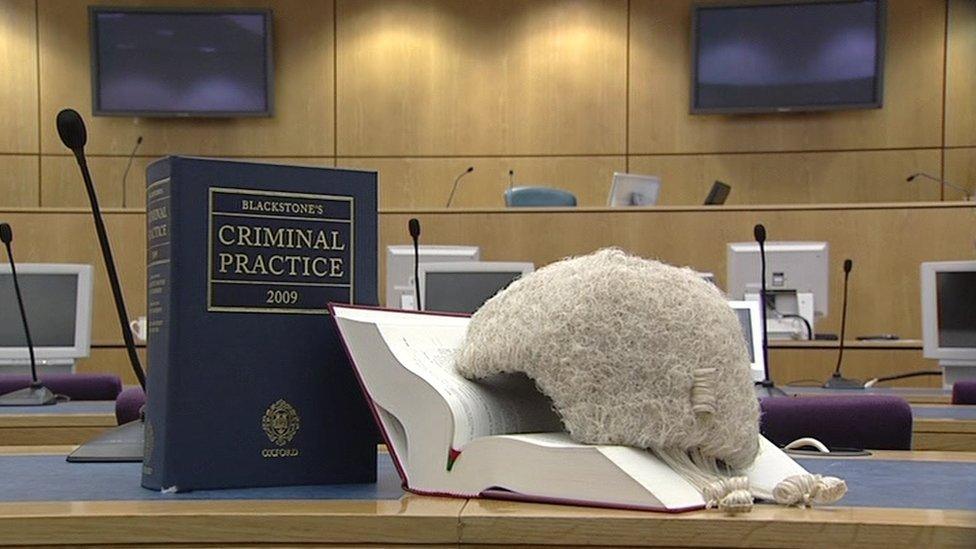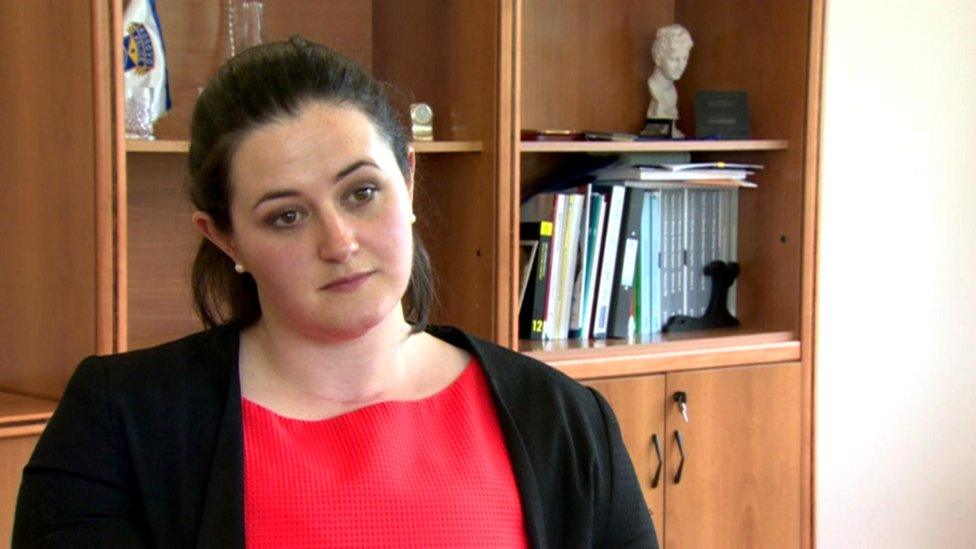NI court cases 'take twice as long as England and Wales'
- Published
- comments

Northern Ireland's criminal justice system does not offer value for money, the Audit Office said
Northern Ireland court cases typically take twice as long to complete and cost significantly more than cases in England and Wales, a report has found.
The Audit Office report has also concluded that Northern Ireland's criminal justice system does not deliver value for money.
It said NI cases usually last more than 500 days, from the date an offence is reported until a verdict is delivered.
It added that 12% of NI prosecution cases take more than 1,000 days.
'Justice delayed is justice denied'
The Northern Ireland Audit Office report - entitled Speeding Up Justice: avoidable delay in the criminal justice system - was published by the Comptroller and Auditor General, Kieran Donnelly.
He said delays in the system were having "negative impacts on victims, defendants and witnesses", and affecting public confidence in criminal justice.
"Justice delayed is justice denied," he said.

Kieran Donnelly said delays were damaging confidence in criminal justice
"What we point out in the report is that you would expect some sort of improvement over the last five years - the thing has more or less stood still.
"We need a step change in improvement, not just some little baby steps."
Mr Donnelly reviewed the performance of the four main justice agencies:
the Police Service of Northern Ireland (PSNI)
the Public Prosecution Service (PPS)
the Northern Ireland Courts and Tribunals Service
the Department of Justice
He has identified weaknesses in the early stages of criminal investigations, when police are gathering evidence and when the PPS is deciding whether or not to prosecute a suspect.
His report also found that once a case reaches court in Northern Ireland, it is "frequently punctuated" by ineffective and adjourned court hearings.
It said court cases were adjourned almost seven times on average before reaching a conclusion.
£819m cost
The Audit Office report criticised the poor time management of court cases, noting that only 57% of trials proceeded on their scheduled date in 2016.
It said these delays had resulted in victims, defendants, witnesses and staff from criminal justice agencies "attending at court for a number of hours but with no actual progress being made on their case".
The report also said there was a "significant financial cost of avoidable delay".
However, it added that this unnecessary cost could not be quantified, due to a lack of detailed financial analysis by the justice agencies.
The watchdog has calculated that, over the course of the year 2016-17, the four organisations spent a combined total of £819m.
"The current system is not good for witnesses, it's not good for victims, nor is it good for value for money, nor is it good in terms of police time," said Mr Donnelly.
"The main problem is at the early stage of the process, the interface between the police and the public prosecution service, the quality of case files going from the police to the PPS.
"There's also an issue around joined up working between all of the parties involved and that could be much much better.
"The key to resolving this - and it's capable of resolution - is much better joined up working."
Mr Donnelly also recommended that judges should be given enough administrative support to facilitate more effective management of court cases.

Former justice minister Claire Sugden said some of the issues could have been addressed if the Northern Ireland Executive had not collapsed
In a joint statement, the PSNI, PPS, Courts Service and Department of Justice said they recognised "there is a need to deliver better value for money".
"We take this opportunity to reaffirm our collective commitment to speeding up justice in Northern Ireland," the joint statement said.
"We have been working to address the specific issues raised by the Northern Ireland Audit Office and improvements are being delivered via a number of initiatives, based around law reform and an increased focus on performance."
Northern Ireland's most recent justice minister, Claire Sugden, said the issues had been highlighted for 10 years, but she had not had enough time in her job to properly address them.
"Two years after the executive has fallen we maybe would have seen more progress had that not been the case," she said.
"Certainly if I had been still in that role I would have announced an end-to-end justice review, looking at the aspects from the start of an offence right through the system to a conviction.
"Unfortunately I lost my job before I could really address it in any significant way."
She added: "It does need that political leadership to press ahead with theses reforms and there are some areas that do require legislation."